Hakka Cuisine – Cooking Style of Hakka People in Asia
Hakka cuisine is created by Hakka people, which is a group of immigrated Han people. The cuisine is mainly popular in Hakka’s concentrated areas, including China’s southeastern mountainous areas like Guangdong, Jiangxi, Guangxi, and Fujian as well as Southeast Asian and south Asian countries like India, Malaysia, Thailand, and Vietnam. The main flavors are salty, original and thick and the main ingredients are meat. The famous dishes are Hakka Stuffed Tofu (Yong Tau Foo), Salt Baked Chicken, Steamed Pork Belly with Preserved Greens, Poon Choi.
Chinese Name: 客家菜
English Names: Hakka cuisine
Popular in: Guangdong, Jiangxi, Fujian, Guangxi, Taiwan, Singapore, Thailand, Vietnam…
Time of Origin: Song Dynasty (960 - 1279 AD)
Flavors: original, salty, thick
Famous Hakka Dishes: Stuffed Tofu, Dongjiang Salt Baked Chicken Steamed Pork Belly with Preserved Greens, Poon Choi…
Famous Snacks: Ground Tea, Sesame Seed Ball, Hakka Ciba…
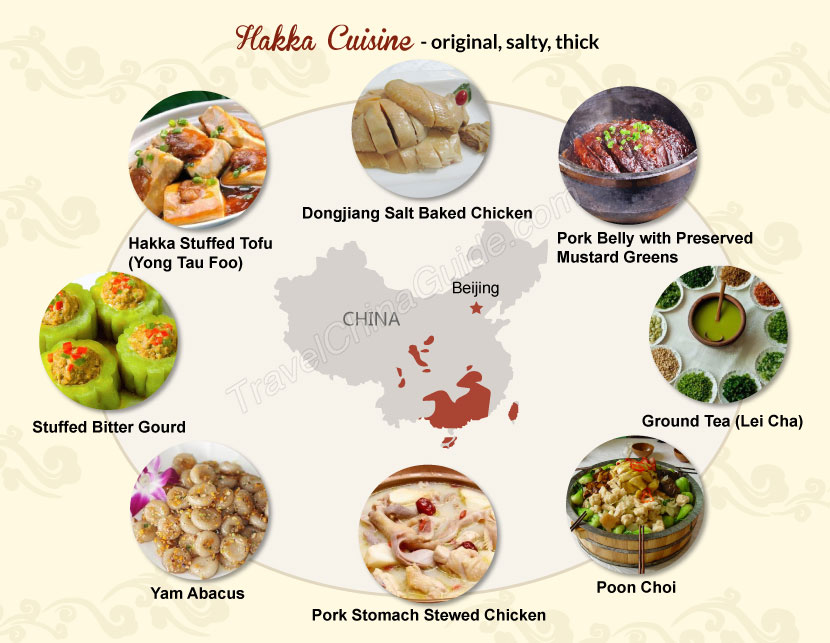 |
Origin & Development of Hakka Cuisine
Hakka means “guests and newcomers”, which indicates the immigration of Hakka people. Historically, Hakka experienced five major migrations from south to north to escape the natural disasters and wars. Although they were far from turmoil and war, they faced a new living environment. In order to survive, they draw on the long-term dietary experience of local residents to adapt to the local climate and geographical environment, made full use of all edible animal and plant resources in the mountains, and gradually form their own new diet habit and cooking techniques. By the end of the Song Dynasty, Hakka dishes began to take shape. During the Ming (1368 - 1644 AD) and Qing Dynasties (1644 - 1911 AD), Hakka cuisine gradually developed into a more mature cooking system.
Features of Hakka Cuisine: Original, Salty, and Thick
In order to keep physical strength on their way to the South, Hakka people often cooked dishes with high calories and high protein content which are heavily flavored and salty but with the original taste of the ingredients.
Since they always live in mountains, domestic livestock, wild animals and wild vegetables and fruits in mountains are their main food materials, while seafood is seldom used.
Compared with other cuisines like Jiangsu cuisine, Hakka food doesn’t look that exquisite for that many dishes were created on their way to escape from war and their life were hard as newcomers in the south. Compared with the appearance, Hakka people cares more about the “content”.
Special Cooking Techniques
“Niang”: Niang means stuffing in English. Hakka people like stuffing the fillings made of pork and other vegetables into other food materials. There are many stuffed dishes in Hakka cuisine such as stuffed bitter gourd, stuffed tofu and so on.
“Ban”: Ban, literally mixing with rice, is a cooking method of Hakka staple food. Hakka people also call this staple food made this way as Ban. The rice powder, glutinous rice powder or tapioca flour all can be cooked into Ban food with other seasonal vegetables. There are over 200 kinds ban food in Hakka cuisine, and the common Bans are wormwood ban, fried Chinese bulbous onion ban, stuffed ban, Mesona chinensis Benth ban, etc.
“Dry”: On Hakka people’s way to the south, the meat and vegetable they took would easily got rotted, so they exposed them under sunlight and dry them to preserve. Eight dry foods in Hakka cuisine are famous: dry bean curd, dry carrot, dry sweet potato, dry vegetables, dry pig gall, dry field mouse, dry meat and dry bamboo shoots.
Other common methods are stewing, roasting, braising which hardly destroy the nutrition and fiber of food. In addition, there are many old and traditional cooking techniques in today’s Hakka recipes. For example, the cooking method of Ground Tea can be traced back to more than 2,000 years ago.
Notable Dishes in Sichuan Cuisine
Hakka Stuffed Tofu (Yong Tau Foo)
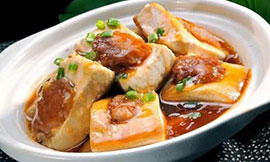
It is a traditional dish of Hakka cuisine China. Dig a hole on the square tofu and stuff the hole with minced meat, mushroom, etc, then boil it over low heat till the surface becomes golden crispy. The flavor of pork penetrates into tofu, which make the tender tofu more delicious.
Dongjiang Salt Baked Chicken
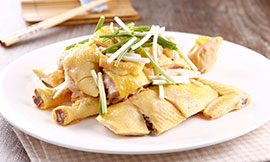
It is a famous Hakka food in Guangdong. It was created in salt works. The chicken is first coated with salt and wrapped with silver paper and then put into the casserole full with fried hot yellow salt. Then bake it for 20 minutes over low heat. The finished chicken is tender, succulent and umami.
Pork Belly with Preserved Mustard Greens
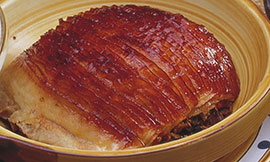
It is a homely dish in Hakka cuisine menu. The streaky pork is first boiled and fried to give it a yellow color, then cut into pieces; after, place the pieces properly in the bowl and then put the preserved vegetables in the middle and steam. The finished streaky tastes extremely soft, moderately salty and slightly sweet.
Ground Tea (Lei Cha)
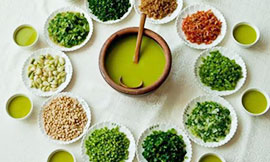
A famous snack or drink popular in Guangdong. The main ingredients are rice, peanuts, sesame, green bean, tea leaves, ginger and other herbs. This Hakka cuisine recipe is easy: ground all the materials into powder, mix it with hot water, and get rid of the dregs. It has a strong aroma of grains and tea, which is very healthy.
Poon Choi
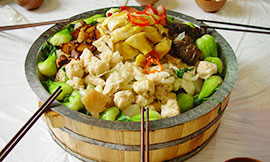
It is a festival dish originated in Southern Song Dynasty (1127 - 1279 AD). Traditional poon choi are served in tubs or pots. The rich ingredients are piled layer upon layer. The bottom materials absorb the rich taste of upper ingredients. People eat from top to bottom and layer by layer just like exploring treasure.
Pork Stomach Stewed Chicken
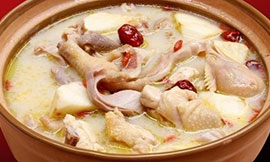
It is a popular starting soup in the banquets of Hakka people. The whole chicken is stuffed into the pork tripe and stewed with many Chinese herbal medicines. Before serving, take out the chicken, dice it and pork tripe and put back into the soup. The soup is thick and clear with a strong herbal medicine aroma. Pork tripe and chicken also taste delicious.
Hakka Cuisine Menu
| English | Chinese | Pinyin |
|---|---|---|
| Hakka Stuffed Tofu (Yong Tau Foo) | 客家酿豆腐 | niàng dòu fu |
| Dongjiang Salt Baked Chicken | 东江盐焗鸡 | dōng jiāng yán jú jī |
| Pork Belly with Preserved Mustard Greens | 梅菜扣肉 | méi cài kòu ròu |
| Ground Tea (Lei Cha) | 擂茶 | léi chá |
| Poon Choi | 盆菜 | pén cài |
| Pork Stomach Stewed Chicken | 猪肚鸡 | zhū dù jī |
| Stir-fried Pork Intestine | 炒大肠 | chǎo dà cháng |
| Yam Abacus | 算盘子 | suàn pán zi |
| Stuffed Bitter Gourd | 酿苦瓜 | niàng kǔ guā |
| Beef Ball Soup | 牛丸汤 | niú wán tāng |
| Hakka Noodles | 客家面 | kè jiā miàn |
| Zijin Beef Ball | 紫金牛肉丸 | zǐ jīn niú ròu wán |
| Braised Pork in Brown Sauce | 红焖肉 | hóng mèn ròu |
| Hakka Drunk Chicken | 酒醉河田鸡 | jiǔ zuì hé tián jī |
| Yang Tofu | 漾豆腐 | yàng dòu fu |
| Duck Stuffed with Rice | 糯米鸭 | nuò mǐ yā |
| Zisu Duck | 紫苏鸭 | zi sū yā |
| Dongjiang Meat Ball | 东江肉丸 | dōng jiāng ròu wán |
Best Hakka Cuisine Restaurants in China
![]() Liao Kunyu Hakka Restaurant
Liao Kunyu Hakka Restaurant
Chinese name: 客家人廖昆玉 kè jiā rén liào kūn yù
Address: Longkou West Road No. 138, Tianhe District, Guangzhou![]() Weilong House Hakka Restaurant
Weilong House Hakka Restaurant
Chinese name: 围龙屋客家食府 wéi lóng wū kè jiā shí fǔ
Address: No.129, Baomin Second Road, Baoan District, Shenzhen![]() Lu Dao Xin Quan Hakka Restaurant
Lu Dao Xin Quan Hakka Restaurant
Chinese name: 鹭岛新泉客家菜 lù dǎo xīnquán kèjiā cài
Address: No.163, Lianqian West Road, Xiamen![]() Yi He Yuan Hakka Restaurant
Yi He Yuan Hakka Restaurant
Chinese name: 夷和源客家菜 yí hé yuán kè iā cài
Address: No.66, Yincheng Road, Pudong New Area, Shanghai![]() Hakka Restaurant
Hakka Restaurant
Chinese name: 客家菜馆 kè jiā cài guǎn
Address: No.103 -1, Nanheyan Street, Dongcheng District, Beijing
![]() Further Reading:
Further Reading: